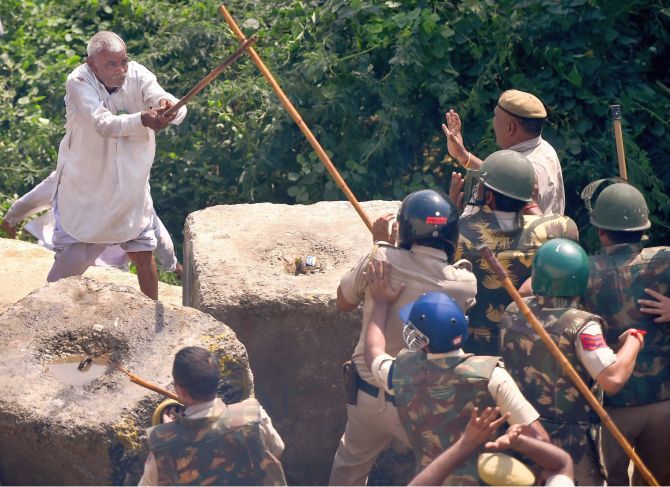'Modi came out with this huge announcement that he has given a historic price rise to farmers.'
'It was actually a fake price. He did not give the price mentioned in the BJP's election manifesto.'
'So, Modi gave an incomplete price rise and publicised it as if he has completed his job.'
'This government has surely proved that it does not care about farmers in any way.'

After witnessing violent protests in which the Delhi police used water cannons and tear gas, farmers ended their Kisan Kranti Yatra at Kisan Ghat in the national capital on Wednesday, October 3, morning.
Thousands of farmers, under the banner of the Bhartiya Kisan Union, marched towards Delhi from Haridwar in support of their demands ranging from farm loan waiver to a cut in fuel prices, pending sugarcane dues and allowing the plying of old tractors.
"It is not the farmers who are agitating, but the government which is actually causing the serial agitations," Jai Kisan Andolan National Convenor Avik Saha tells Rediff.com's Syed Firdaus Ashraf.
After their march on Mumbai in March, farmers have now stepped out to protest at the gates of Delhi. Why are farmers' agitations becoming so regular?
First, the government used lies, then cruel lies and now it is using barbaric lies (against farmers).
No settlement has taken place with any farmers group up to now which has been implemented.
Each time farmers become agitated and step out for a rally, the government quickly swoops down and offers some kind of settlement, but never implements it.
The government also knows they will wait for the next agitation.
So, it is not the farmers who are agitating, but the government which is actually causing the serial agitations. I don't know why they are doing this because it seems politically very stupid.
What kind of agreement did the government sign during the Mumbai farmers protest? Was it adhered to?
The core demand which can solve 90 per cent of other demands is profitable remunerative price.
Not just declaration of the price, but the government must ensure that farmers get that price.
Take the case of the March protest in Mumbai. Maharashtra Chief Minister Devendra Fadnavis promised the farmers that he would accompany them to the Centre and urge on their behalf that farmers of Maharashtra must get profitable remunerative price and their products must be procured.
Nothing happened.
Prime Minister Narendra (Damodardas) Modi came out with this huge announcement that he has given a historic price rise to farmers which is better than (the earlier government's price).
It was actually a fake price. He did not give the price which they had mentioned in the Bharatiya Janata Party's election manifesto (as mentioned by the M S Swaminathan Commission).
So, PM Modi gave an incomplete price rise and publicised it as if he has completed his job.
And worse, there is no mechanism to ensure that farmers get that price.
What price should PM Modi have given? Could you please explain by giving one example?
On September 6, 2018 he announced a hike in the MSP for kharif crops. The announcement came a month late.
Take a look at paddy. The price (set by the government per quintal for MSP) is Rs 1,750, but if you calculate it via the C2 formula (based on the Swaminathan Commission report), then the price comes amounts to Rs 2,200.
The tragedy is that farmers did not get Rs 1,750 also as there is no mechanism of purchase or marketing of purchase.
If the government is not buying food grains from farmers, why announce the (MSP) price then?
If you and I go to buy a product in a shop there is MRP on every product.
If the shopkeeper sells at a higher price then you will protest. As a consumer you are protected by the law and you have a legal right to demand the right MRP.
For farmers, they have MSP, but they have no legal right to demand it, to get it. So why do this futile exercise?
Ultimately, this turns out to become only a big political announcement.
It is not Modi alone, previous governments too did the same thing.
What about the Ashok Dalwai report which proposes a radical overhaul of the agriculture ecosystem by moving from a supply-push production system to a demand-led one?
Prime Minister Modi changed track and said he would double the income of farmers by 2022.
Remember, this was not a part of their manifesto in 2014. It was not uttered by any of the BJP leaders in their speeches before 2014.
Doubling the farmers income by 2022 came as an afterthought as all the promises for farmers in the BJP manifesto were not fulfilled.
And what do we see? We saw firstly the time frame was way outside Modi's five-year term.
Basically, the announcement was made so that you cannot hold him accountable. But even if he announced a 100 per cent increase by 2022, you would have seen increases year by year.
But in the last four years of the Modi government the composite increase (of farmers's incomes) is only 2 per cent.
With the 2 per cent increase from 2014 to 2018, are you telling me that the balance 98 per cent will come by 2022, that is, in the next four years?
The NITI Aayog itself has published documents that 2022 is not a reasonable target, that it should be 2024. Now they have changed it to 2026. It is a constant shifting of goal posts and promises.
Farmers are in a state of disbelief and they do not believe the Modi government anymore.
They are agitating as they don't know anything else. This government has surely proved that it does not care about farmers in any way.
The Delhi agitation has come to an end and it is now being reported that a bigger protest will be held in the last week of November. This seems to be a never-ending cycle.
There are different farmer organisations in India, and let us not forget that India is a large country. Just like we have a multi-party system, we have multi-farmer organisations.
The one that we saw on Tuesday was led by the Bharatiya Kisan Union. It is no secret that the BKU is close to the BJP. Their supreme leader Rakesh Tikait is part of the Uttar Pradesh agricultural commission. He has the rank of a cabinet minister.
So yesterday (Tuesday, October 2) it was the BKU versus the BJP. Why was it that way? I don't know, but that didn't look like a very genuine farmers agitation to me.
And the rapid response of the government and how quickly the demands were looked into and supposedly the demands were met is quite suspicious, but nevertheless there were farmers who definitely had the same problems as all other farmers of India have and they were genuinely suffering people.
The core issue, however, was not addressed -- that is price and freedom from debt.
I have again and again said if you do not give farmers the proper price, they will always remain in the debt trap. And you will constantly have to deal with debt freedom.
Actually, the political system wants it to remain as is because it becomes an electoral issue.
And the most important thing is that there has to be political will and administrative structure to look at a solution to the problem. The government does not have that.
It has announced the formation of umpteen committees. One of the people who is currently in charge of agriculture is Ramesh Chand (NITI Aayog member).
Ramesh Chand's own committee of 2013 dealt with the issue of cost and his own recommendations have not been implemented.
Why do we have so many committees set up to solve farmers issues and, more importantly, why are we wasting time on such committees as the farmers are back on the roads protesting?
They are not only wasting time, but also public resources as these committees meet in five-star hotels at the cost of the exchequer.
In India, the meaning of governance, and this is not limited to the BJP, is to show activity rather than carry out the activity.
Mainstream political parties are vote garnering machines. Their primary purpose of existence is to garner votes and not to deal with the problems of the country.










